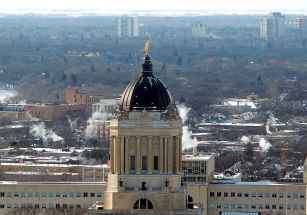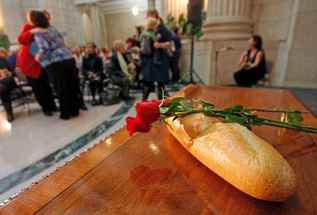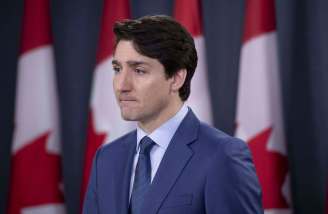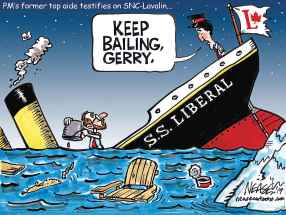Hurried tax cut loaded with risk, lousy odds for reward
Read this article for free:
or
Already have an account? Log in here »
To continue reading, please subscribe:
Monthly Digital Subscription
$0 for the first 4 weeks*
- Enjoy unlimited reading on winnipegfreepress.com
- Read the E-Edition, our digital replica newspaper
- Access News Break, our award-winning app
- Play interactive puzzles
*No charge for 4 weeks then price increases to the regular rate of $19.00 plus GST every four weeks. Offer available to new and qualified returning subscribers only. Cancel any time.
Monthly Digital Subscription
$4.75/week*
- Enjoy unlimited reading on winnipegfreepress.com
- Read the E-Edition, our digital replica newspaper
- Access News Break, our award-winning app
- Play interactive puzzles
*Billed as $19 plus GST every four weeks. Cancel any time.
To continue reading, please subscribe:
Add Free Press access to your Brandon Sun subscription for only an additional
$1 for the first 4 weeks*
*Your next subscription payment will increase by $1.00 and you will be charged $16.99 plus GST for four weeks. After four weeks, your payment will increase to $23.99 plus GST every four weeks.
Read unlimited articles for free today:
or
Already have an account? Log in here »
Hey there, time traveller!
This article was published 07/03/2019 (2474 days ago), so information in it may no longer be current.
Welcome to Premier Brian Pallister’s version of Risky Business.
In its 2019-20 budget, tabled Thursday, Manitoba’s Progressive Conservative government surprised nearly everyone by delivering a one-point cut to the provincial sales tax a year earlier than originally pledged.
It’s a bold and risky strategy that will ultimately eliminate more than $330 million in revenue on an annual basis. Adding to the risk is reality that the Tories are introducing the tax cut before they have actually balanced the budget, and in a year in which economic growth is expected to slow considerably and the province is facing the likelihood of a major spring flood.
This is the fiscal equivalent of waiting until rush hour to convene a street hockey game on Pembina Highway. Not certain death, but a high probability of crippling injury.
Given the danger level of this decision, and the high probability of negative repercussions, why would Pallister deliver his tax cut now, a year earlier than he had promised?
Some believe the premier wants to do it now so that he is free to call an early election. There may be some advantage for the Tories to go to the polls earlier than the fall of 2020, but there are also complications. Such as the fact that there will be a federal election this fall that will sap much of the money and volunteer muscle needed to wage a provincial election.
Others will argue that the premier was simply lacking any capacity for delayed gratification and wanted to deliver on his most-prized pledge from the 2016 budget to help counteract all the criticism he is getting over cuts to program spending. That comes at a cost; Pallister has yet to table a balanced budget, meaning that he is borrowing money to deliver a tax cut that will have little or no impact on the lives of most Manitobans.
Despite rigorous expenditure control, the estimated deficit for this year is $360 million. It’s a significant improvement over what the Tories inherited when they came to power, but still a long way away from a surplus that would make this tax cut more sensible and less risky.
It’s also hard to endorse the idea that somehow Manitobans will see the tax cut as a fair reward for the tough love Pallister has dished out on expenditures. From infrastructure to health and public education, the provincial government has employed a virtual freeze on major program spending.
For example, the Tories have budgeted to spend $6.6 billion on health in the 2019-20 fiscal year. That would represent a 1.8 per cent increase over the previous year. However, some context is required to understand the austerity being applied to the health budget.
Last year, the province underspent on health care by $238 million. The year before, the Tories underspent by $138 million. Finance Minister Scott Fielding claimed his government was making a record investment in health care, but the end result is that health-care spending is going up annually by less than one per cent, a rate that could be fairly represented as a “cut” when you consider the dual impact of inflation and population growth.
However, to really understand the risk involved in this tax cut, you have to look at two fiscal factors that have been behind the precipitous drop in the budget deficit.
First, the Tories are reaping enormous benefits from the unofficial, province-wide wage freeze for provincial civil servants and those who toil for government indirectly through the education and health-care systems. After refusing to proclaim its own wage-freeze law, the Tories have simply refused to negotiate new contracts, allowing them to avoid wage increases that could frustrate their deficit-fighting strategies.
And second, Pallister is leaning heavily on Manitoba’s status as a so-called “have-not province,” and the unprecedented windfall in federal transfer payments that comes with that designation.
In this budget, the province is forecasting a remarkable $4.815 billion in payments under the Canada Health Transfer, one-time funding from the new national health-care accord, the Canada Social Transfer, various other cost-shared programs and, of course, the Equalization program.
That is $324 million more than Manitoba received the previous year. Federal transfers now account for 28 per cent of all revenues, the largest single source of money flowing into the provincial treasury.
Given all that, will Manitobans view this tax cut as sound fiscal policy? Unfortunately for the Tories, a trio of fiscal threats may prevent them from reaping any real credit for cutting the PST.
This budget includes a forecast for a 1.6 per cent increase in GDP over the next year, a rate that is decidedly optimistic given that other economic think-tanks have pegged our economy to grow at less than one per cent. That means a slowing or even reduction in own-source revenues that cannot be made up by federal transfer payment largesse.
And then, there is the recent provincial forecast that suggested we are likely to see spring flooding similar to that experienced in 2011.
If the rivers rise to anywhere near 2011 levels, it will require unanticipated expenditures that will be measured in the hundreds of millions of dollars. Right now, the Tories have set aside about $50 million to fight all natural disasters.
The counterpoint to all this doom and gloom is Fielding’s argument that the PST cut will boost employment, earnings and economic growth. Those claims are fundamentally unfounded.
There are always winners and losers in any tax-cut equation, but overall there is no way to ensure that the people who receive a tax windfall such as this one spend the money in the jurisdiction in which they live. That “leakage,” as economists call it, means that tax cuts on their own don’t lead to economic growth.
The PST cut can only work if the Tories continue to enjoy unprecedented luck in the form of record transfer payments and a nearly complete absence of significant natural disasters.
If either of those two factors fail the finance minister, so too will this budget.
dan.lett@freepress.mb.ca

Born and raised in and around Toronto, Dan Lett came to Winnipeg in 1986, less than a year out of journalism school with a lifelong dream to be a newspaper reporter.
Our newsroom depends on a growing audience of readers to power our journalism. If you are not a paid reader, please consider becoming a subscriber.
Our newsroom depends on its audience of readers to power our journalism. Thank you for your support.










